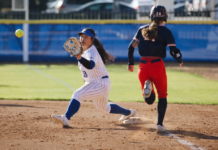
The NCAA announced Wednesday, June 20 that the UC Riverside men’s basketball team is banned from competing in the 2013 Big West tournament due to not meeting academic requirements. Along with the postseason ban, the team’s practice time will be reduced by one day. The day off will become an academic study session where players will only work on their classroom studies. The ban will likely hurt the team, who recently gained momentum after finishing fifth in the league this past season.
The NCAA recently instituted the Academic Progress Rate (APR), which requires programs to maintain a minimum score of 900. The scoring system gauges student athletes’ classroom performances over a two and four year period. UCR from the 2007-08 through 2010-11 academic years had an APR score of 887, falling below the 900 minimum.
This is the first season the NCAA implemented the APR score with all Division I schools, and as of now 10 schools from a wide range of conferences face a postseason ban like Riverside. The most notable school to face a ban is the University of Connecticut, who has won national titles in 1999, 2004 and 2011. UConn’s absence in postseason play will be noted nationally.
The issue arose when men’s basketball Head Coach John Wooldridge allowed three former players who fulfilled their NCAA eligibility to remain on their scholarships to finish courses needed to achieve their degree. However, these three athletes did not finish their courses, and even though they were not on the team roster, the fact they were on the scholarship given by the men’s basketball program resulted in sending the program’s APR score crashing south of the 900 minimum. Coach Wooldridge told the Press-Enterprise that his decision to give scholarships to former players was the right one and that he would do it again if it gave student-athletes a chance to get their degrees.
“I feel really bad for the players in this case. To play a regular season without a postseason is basically like playing preseason games for the whole year. I would not blame the players for not having any passion to win, since their efforts would never give them a chance to compete for any titles. The worse part of this ban is that the current players are being punished for mistakes by others. It’s almost like grade school where the whole class got punished due to the actions by a few irreverent others. It’s just unfair,” said Edwin Chow, a third-year UCR biology student.
The UCR athletic department will look to appeal the NCAA ban, but the chances for reversal are very slim—based on prior strict guideline enforcement. The main argument supporting UCR’s reason for appeal is that the current roster going into the upcoming season has an APR score of 989. Therefore, the athletics department believes the current roster should not be punished based on the actions of former athletes. Many colleges have called for the NCAA committee to review the way the organization gathers their data when calculating an APR score. As of now, the NCAA committee has a held a steady ground on the issue.







